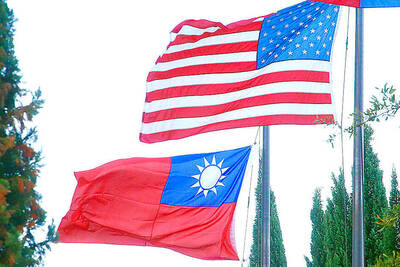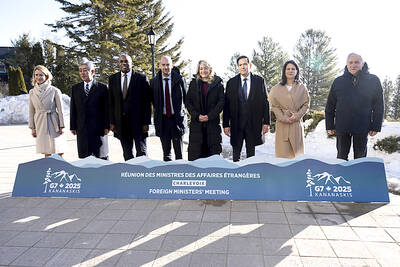Top diplomats from G7 nations sought to project unity on China and other issues after French President Emmanuel Macron stirred unease across the bloc with a conciliatory tone on a recent trip to Beijing.
“The last day has only reinforced the convergence of views that we have on the approach to the most important issues of the day,” US Secretary of State Antony Blinken said alongside French Minister of Foreign Affairs Catherine Colonna, following a meeting in the mountain resort of Karuizawa, Japan.
The statement of harmony masked differences behind the scenes that spilled into the open following Macron’s state visit to Beijing, after which he said the EU should avoid being dragged into a dispute with China by the US.

Photo: AP
The trip amounted to a diplomatic coup for Chinese President Xi Jinping (習近平), who has sought to divide the US and its long-time allies.
German Minister of Foreign Affairs Annalena Baerbock, who also attended the meetings in Japan, struck a starkly different tone during and after her own trip to Beijing last week.
While Chinese Minister of Foreign Affairs Qin Gang (秦剛) sought to impress her, including with a trip from his hometown of Tianjin to Beijing, Baerbock emerged more skeptical with China than before, a person familiar with her thinking said.
Baerbock felt lectured by Qin and was disappointed that China’s leadership was not willing to call Ukrainian President Volodymyr Zelenskiy as part of a peace plan from Xi that many Western nations see as pro-Russian, the person said.
Baerbock yesterday underscored that Germany would not compromise on its values when it comes to engaging with China.
In response to a question on Taiwan, she said that “Europe won’t look away” if international law is violated.
“I made clear in China: We want to cooperate, we want to be partners, but we are not naive,” she told reporters in Japan.
Baerbock and her French counterpart both briefed their colleagues on Sunday night about their China visits as part of attempt to coordinate messaging on how the EU should approach the world’s second-biggest economy, a person familiar with the calls said.
They agreed on an approach that emphasized trying to cooperate with Beijing wherever possibly, while derisking their economic reliance on China and sending clear signals that Chinese weapon deliveries to Russia — as well as military escalation with Taiwan — would be unacceptable, the person said.
The G7 has translated its close coordination on arming Ukrainian forces over the past year into a renewed dialogue on the challenges presented by China, a senior US Department of State official told reporters yesterday evening.
The group sees the need to stay engaged with China while standing up against any coercive measures or efforts to change the “status quo” in Taiwan, the official said.
Ahead of a G7 leaders’ summit in Hiroshima, Japan, next month, the foreign ministers also discussed how to provide critical infrastructure investments across the developing world to give countries a high-quality alternative to Chinese investments, the official said.
The ministers agreed at a session yesterday that there should be regular talks within the G7 framework on the Indo-Pacific region to strengthen coordination with Southeast Asian nations and others in the region, the Japanese Ministry of Foreign Affairs said in a statement.
Standing together on China is “extremely important,” Japanese Minister of Foreign Affairs Yoshimasa Hayashi said in a statement following a working dinner with other foreign ministers on Sunday night.
Japan and the UK will “continue to coordinate closely in addressing issues related to China,” he said after a bilateral meeting yesterday with British Secretary of State for Foreign, Commonwealth and Development Affairs James Cleverly.

NATIONAL SECURITY: The Chinese influencer shared multiple videos on social media in which she claimed Taiwan is a part of China and supported its annexation Freedom of speech does not allow comments by Chinese residents in Taiwan that compromise national security or social stability, the nation’s top officials said yesterday, after the National Immigration Agency (NIA) revoked the residency permit of a Chinese influencer who published videos advocating China annexing Taiwan by force. Taiwan welcomes all foreigners to settle here and make families so long as they “love the land and people of Taiwan,” Premier Cho Jung-tai (卓榮泰) told lawmakers during a plenary session at the Legislative Yuan in Taipei. The public power of the government must be asserted when necessary and the Ministry of

Proposed amendments would forbid the use of all personal electronic devices during school hours in high schools and below, starting from the next school year in August, the Ministry of Education said on Monday. The Regulations on the Use of Mobile Devices at Educational Facilities up to High Schools (高級中等以下學校校園行動載具使用原則) state that mobile devices — defined as mobile phones, laptops, tablets, smartwatches or other wearables — should be turned off at school. The changes would stipulate that use of such devices during class is forbidden, and the devices should be handed to a teacher or the school for safekeeping. The amendments also say

EMBRACING TAIWAN: US lawmakers have introduced an act aiming to replace the use of ‘Chinese Taipei’ with ‘Taiwan’ across all Washington’s federal agencies A group of US House of Representatives lawmakers has introduced legislation to replace the term “Chinese Taipei” with “Taiwan” across all federal agencies. US Representative Byron Donalds announced the introduction of the “America supports Taiwan act,” which would mandate federal agencies adopt “Taiwan” in place of “Chinese Taipei,” a news release on his page on the US House of Representatives’ Web site said. US representatives Mike Collins, Barry Moore and Tom Tiffany are cosponsors of the legislation, US political newspaper The Hill reported yesterday. “The legislation is a push to normalize the position of Taiwan as an autonomous country, although the official US

CHANGE OF TONE: G7 foreign ministers dropped past reassurances that there is no change in the position of the G7 members on Taiwan, including ‘one China’ policies G7 foreign ministers on Friday took a tough stance on China, stepping up their language on Taiwan and omitting some conciliatory references from past statements, including to “one China” policies. A statement by ministers meeting in Canada mirrored last month’s Japan-US statement in condemning “coercion” toward Taiwan. Compared with a G7 foreign ministers’ statement in November last year, the statement added members’ concerns over China’s nuclear buildup, although it omitted references to their concerns about Beijing’s human rights abuses in Xinjiang, Tibet and Hong Kong. Also missing were references stressing the desire for “constructive and stable relations with China” and